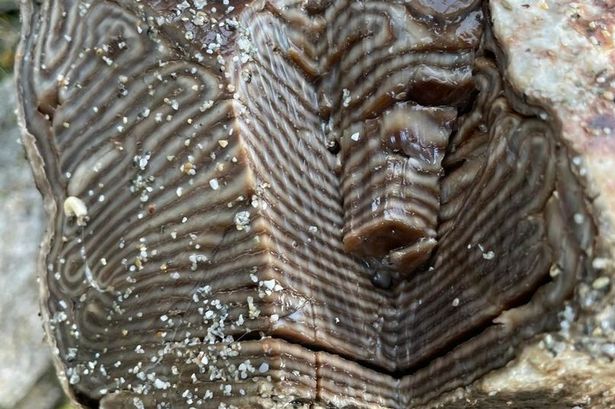Mystery object washed up on beach at holiday hotspot ‘from 100-year-old shipwreck’
It is thought the bales of rubber come from a ship that sunk in the early 20th century when raw rubber was transported from the UK’s colonies abroad

Image: Falmouth Coastguard Rescue Team / Facebook)
An peculiar-looking object that washed up on a Cornish shore and mystified beach goers has been identified as likely being an 100-year-old bale of rubber sheets.
The square package-like object was discovered at Castle Beach in Falmouth, by a member of the public who called 999.
A team from Falmouth Coastguard Rescue Team attended on Monday, November 21.
A spokesman for the team said: “Everyone loves a mystery washed up object. This afternoon we were called to an ‘unknown’ object washed ashore at Castle Beach in Falmouth.
“Team members attended, investigated and removed said object to a safe place for collection by the local authority.
(
Image:
Falmouth Coastguard)
“With the recentweatherand predicted forecasts coming up, it goes without saying that if you spot anything you’re unsure of washed ashore at the coast, contact the Coastguard. We can attend and help identify as needs be.”
People commenting on the coastguard post on Facebook believed the object was a bale of rubber sheets, Cornwall Live reports.
In 2013, about 40 large blocks of a rubber-like substance, believed to be from a shipwreck 80 miles (130km) off the coast of Brittany that took place than 100 years ago, washed up on several European coasts.
Over the years, Senawang rubber bales have been found on beaches in Marazion, Perranuthnoe and other locations in Cornwall.
It is thought the bales of rubber come from a ship that sunk in the early 20th century when raw rubber was transported from the UK’s colonies abroad. Rubber was imported to Britain to insulate telegraph cables on the seabed.
Marc Cragg from the Porthcurno Telegraph Museum in Cornwall told the BBC back in 2013: “Gutta percha is from Indonesia and is very similar to rubber. It has been a central part of telegraph systems for the last 100 years or so.”
“The pieces of gutta percha were found on beaches in Cornwall, Devon, northern France and the Netherlands.”
The Falmouth Coastguard rescue team spokesman added: “Remember some things can be explosive. Don’t touch it. Dial 999 and ask for Coastguard right away. The callers in both of these incidents did exactly the right thing by calling us.
“It’s never a waste of time.”
